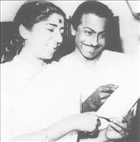


So now they say Lata Mangeshkar is almost eighty. The dates on calendar confirm that, so it must be true. But in my mind, Lata stays young, forever young. Her countless songs keep echoing there, rekindling memories from different stages of my life. Practically all my life, in happiness and in sorrow, that voice has shared my emotions, many a time providing an expression to the unexpressed. Yes, over the years that voice has aged, becoming just a shadow of what it was but still even today, it feels reassuring to hear it. It feels as if at least some of the things dear to my heart are still standing there in this fast-changing, frightening world.
O Sajana Barakha Bahar Aayi from Parakh (1960) is the song that defines Lata in my mind. Out of her myriad memorable songs, somehow this song for me represents true essence of Lata’s matchless virtuosity. Free-flowing like an unbridled river and fragrantly fresh like a blooming flower – her voice is one to die for in this song. Purity and perfection, innocence and intensity, dignity and divine sweetness, expressiveness and erudition – all precious qualities of her singing shine through this exquisite rendition.
Actually this song was first recorded as a Bengali non-film song. Initially composer Salil Choudhury was none-too-happy about his tune because of some negative remarks from his colleagues. He himself, almost reluctantly wrote the Bengali lyrics – Na Jeo Na just before the recording. That day even Lata was unwell and yet, the song went on to become a huge hit in Bengali.
Director Bimal Roy chose this tune for his Hindi film Parakh and picturised it beautifully – an angelic-looking Sadhana playing a just-fallen-in-love demure village-girl enjoying the first monsoon drizzle while fondly remembering her loved one.
Tumko Pukare Mere Man Ka Papihara/
Meethi Meethi Agani Mein Jale Mora Jiyara/
O Sajana Barakha Bahar Aayi/ Ras Ki Phuhaar Laayi/
Ankhiyon Mein Pyar Laayi/ O Sajana Barkha Bahar Aayi– who else but Shailendra could write such tenderly poetic and romantic lyrics?
With a sitar, a tabla, a jaltarang, a flute and a few violins, Salil provided just the basic minimum orchestral backdrop and let Lata’s vocal artistry do the rest. Simple as it seems, this Khamaj raga-based semi-classical tune has a plenty of musical intricacies that only Lata could do justice to. Listening to Lata’s delicate runs and bridges in the lines - Aisi Rimjhim Mein O Sajan Pyaase Pyaase Mere Nayan/ Tere Hi Khwab Mein Kho Gaye simply takes one’s breath away and further when she sings Saanwari Saloni Ghata Jab Jab Chhaayi/ Ankhiyon Mein Raina Gayi Nindiya Na Aayi, the way she says the word ‘Ghata’ is pure magic!
Every time I listen to this song, it lights up my mind with its ethereal beauty and suddenly world seems a much better place to live in. Years after years, that bewitching Lata-magic keeps doing this trick. That’s why Lata forever remains young in my mind! Forever!